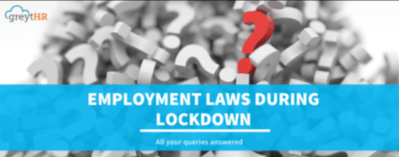Answering the concerns on how organizations should deal with employees and operations during these tough times.
COVID-19 has brought upon us a nationwide lockdown. Organizations barely have had time to prepare themselves for the contingency. Companies have been forced to act and adapt quickly. Several questions and concerns have emerged on how organizations should deal with employees and operations during these tough times. Greytip organized an expert session webinar on Employment Law, by a leading Industry Expert Mr. Pratik Vaidya, CEO and Principal Consultant, Karma Management Solutions. The webinar attracted tremendous interest with over 1400 registrations and 500 attendees.
In our blog, we attempt to answer the top TEN questions addressed to the speaker.
Which business establishments are allowed to operate in lockdown?
All establishments involved in the provision or delivery of essential services will remain operational. Companies falling into the category of “essential services” can refer to their respective state guidelines for more details. Source- Guidelines issued by the Ministry of Home Affairs on March 24, 2020
How do companies continue their on-premise function during a lockdown?
To continue with the on-premise operation, a company must fall into the category of “essential services.” The functioning premise should adhere to all health and safety standards as prescribed by the Government of India. Every employee should be issued passes or letters signed by the authorities that permit them to travel to their workplaces during this lockdown period.
Is “Work-from-Home” applicable to all employees across industries?
An employee can be asked to work from home during this hour of crisis depending on his/her nature of work. He/she should be paid his full salary if he works for the same man-hours that he would have otherwise done.
If the nature of work restricts work-from-home, should the employee be paid?
It is mandatory for a company to pay the employees during this lockdown if
a) The working premise is not operational
b) His/her nature of work does not allow him to work from home.
Under such circumstances, the employees will be deemed to be on duty and hence paid their salaries. The State of Telangana and Uttar Pradesh has stated that shops and establishments that are exempted from the lockdown shall declare paid holiday for all categories of its employees during this period.
Should the local authorities be reported on employees' travel history?
The employer does not need to report details on the employee’s travel history. If the employee is showing symptoms or is a primary contact of an infected person, he/she should be advised to seek medical help. As a moral obligation towards society, the employee should be asked to inform the concerned local authorities and cooperate for contact mapping if suspected of infection.
How should a company handle a positive case of COVID-19 within the organization?
A few State Governments have issued notifications mandating employers to grant 28 days of paid leave to employees who have been infected with COVID-19. If an employee gets infected while on duty or official tour, it is recommended that the issue is handled with extreme sensitivity and empathy.
What is the prescribed leave policy for COVID-19 affected employees?
If an employee is a primary contact of an infected COVID-19 patient or who has had a recent personal travel history should self-quarantine for 14 to 28 days. The employer under such a situation can ask the employee to avail his/her annual leave or sick leave, subject to any specific Government notification in this respect. However, the employee cannot be forced to utilize his/her sick or annual leave if the travel was for official purposes.
The Government of Karnataka has issued a notification that mandates the organizations to grant 28 days paid leave to employees who are infected with COVID-19.
Under what circumstances can an employee be asked to produce medical test reports?
Any medical data in electronic form is deemed as sensitive and personal data, hence an employee cannot be forced to share the same. He/she can be asked to produce a fitness certificate/medical certificate from a registered medical practitioner, stating that the employee is healthy and fit to work. If the medical certificate or fitness certificate is being provided in the electronic form, the employer should adhere to the requirements prescribed under the Information Technology Act, 2000 (IT Act) and the Information Technology (Reasonable Security Practices and Procedures and Sensitive Personal Data or Information) Rules, 2011 (Security Practices Rules).
Can hours of work and wages be reduced to minimise the impact on the business?
An organization can introduce a reduced wage for reduced work hours abiding by the process prescribed under law. An employer may also decide to pause non-statutory benefits and postpose incentives until the business situation normalizes. Many companies are implementing salary deferments to control cash-outflow as a mutually beneficial option.
Can employees refuse to report to work fearing possible contraction of COVID-19?
If the company is exempted from lockdown and is functionally complying with prescribed standards of health, safety, and hygiene, an employee cannot refuse to report to work.
An employer can take any necessary action if a fit and a healthy employee refuses to adhere to a legally valid employment requirement. But in the current situation, it is advised that the organizations deal with such a situation with utmost empathy because certain impulsive decisions may cause irreparable damage.
Did you find this blog useful? Do let us know the topics you would want us to cover in our upcoming webinar in the comment section below.
Click here to get the complete recording of the live webinar.









